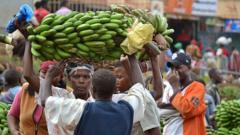Tanzania has taken a firm stance against South Africa and Malawi by instituting a complete ban on agricultural imports, a move deemed necessary to protect its business interests. Agriculture Minister Hussein Bashe announced the decision amid escalating trade disputes that have seen South Africa restrict the entry of Tanzanian bananas and Malawi impose restrictions on various products, including maize and rice. Despite ongoing diplomatic negotiations, a resolution remains elusive.
Tanzania Implements Ban on Agricultural Imports from South Africa and Malawi Amid Trade Disputes

Tanzania Implements Ban on Agricultural Imports from South Africa and Malawi Amid Trade Disputes
In a bid to safeguard its economic interests, Tanzania has banned all agricultural imports from South Africa and Malawi, highlighting ongoing trade tensions between the nations.
Tanzania's recent import ban on South Africa and Malawi underscores the intensifying trade conflicts among the three Southern African nations. Minister Hussein Bashe indicated that the ban is crucial to safeguard Tanzania's economic interests, especially after years of perceived unfair restrictions from its neighbors. The action came in response to longstanding grievances, particularly South Africa's prohibition of Tanzanian bananas and Malawi's previous bans on important commodities.
Malawi's Trade Minister, Vitumbiko Mumba, previously announced a ban on select imports to protect local producers, emphasizing its temporary nature; however, its implications have reverberated back to Tanzania, prompting Bashe to act. As the trade row escalates, both South Africa and Malawi's economies might feel the impact, especially as Malawi heavily relies on Tanzanian ports for exports like tobacco and sugar.
With this ban, Tanzania aims to assert more control over its market space, ensuring that local producers are not overshadowed by foreign competition. While Bashe reassured Tanzanians of food security despite the ban, he emphasized the importance of equal market access within the region. The future of trade among these nations remains uncertain, as diplomatic efforts proceed amidst growing tensions.
As the political landscape evolves, the ramifications of this ban may shift trade dynamics within the Southern African Development Community (SADC) and force neighboring countries to reconsider their trade policies.
Moving forward, Malawi may face challenges in rerouting its exports through potentially costlier ports in Mozambique, while Tanzania contemplates new trading partnerships with countries like Kenya, Namibia, and South Sudan. The unfolding situation will be crucial to watch as regional trade relations develop.
Malawi's Trade Minister, Vitumbiko Mumba, previously announced a ban on select imports to protect local producers, emphasizing its temporary nature; however, its implications have reverberated back to Tanzania, prompting Bashe to act. As the trade row escalates, both South Africa and Malawi's economies might feel the impact, especially as Malawi heavily relies on Tanzanian ports for exports like tobacco and sugar.
With this ban, Tanzania aims to assert more control over its market space, ensuring that local producers are not overshadowed by foreign competition. While Bashe reassured Tanzanians of food security despite the ban, he emphasized the importance of equal market access within the region. The future of trade among these nations remains uncertain, as diplomatic efforts proceed amidst growing tensions.
As the political landscape evolves, the ramifications of this ban may shift trade dynamics within the Southern African Development Community (SADC) and force neighboring countries to reconsider their trade policies.
Moving forward, Malawi may face challenges in rerouting its exports through potentially costlier ports in Mozambique, while Tanzania contemplates new trading partnerships with countries like Kenya, Namibia, and South Sudan. The unfolding situation will be crucial to watch as regional trade relations develop.
















